 Petzlover
Petzlover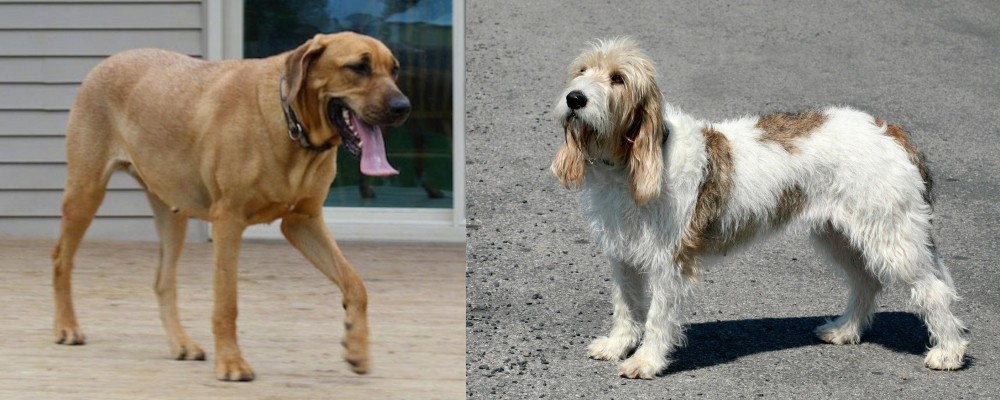 Danish Broholmer is originated from Denmark but Grand Basset Griffon Vendeen is originated from France. Danish Broholmer may grow 30 cm / 12 inches higher than Grand Basset Griffon Vendeen. Danish Broholmer may weigh 40 kg / 89 pounds more than Grand Basset Griffon Vendeen. Both Danish Broholmer and Grand Basset Griffon Vendeen has almost same life span. Both Danish Broholmer and Grand Basset Griffon Vendeen has almost same litter size. Both Danish Broholmer and Grand Basset Griffon Vendeen requires Moderate Maintenance.
Danish Broholmer is originated from Denmark but Grand Basset Griffon Vendeen is originated from France. Danish Broholmer may grow 30 cm / 12 inches higher than Grand Basset Griffon Vendeen. Danish Broholmer may weigh 40 kg / 89 pounds more than Grand Basset Griffon Vendeen. Both Danish Broholmer and Grand Basset Griffon Vendeen has almost same life span. Both Danish Broholmer and Grand Basset Griffon Vendeen has almost same litter size. Both Danish Broholmer and Grand Basset Griffon Vendeen requires Moderate Maintenance.
 The Danish Broholmer is also known as the Danish Mastiff. This is a large dog which comes from Denmark.
The Danish Broholmer is also known as the Danish Mastiff. This is a large dog which comes from Denmark.
Known as a molosser breed, the dog used to fulfill a guard dog role in the home of wealthy Danish people. There are those who take one look at the dog’s size and build, and regard him as aggressive, when in fact he is a calm, good-tempered dog.
The origin of this large dog breed goes way back to the Middle Ages, although details of the dog’s origins are unknown. The Broholmer comes from mixing the English Mastiff and various local German breeds, being named after the Sehested of Broholm.
The dog all but became extinct during the Second World War. It was in 1974 that the Danish Kennel Club started looking to revive the breed. The breed was revived and the dog was imported to the United Kingdom in 2009. The Danish Broholmer has been recognized by the United Kennel Club in 2006.
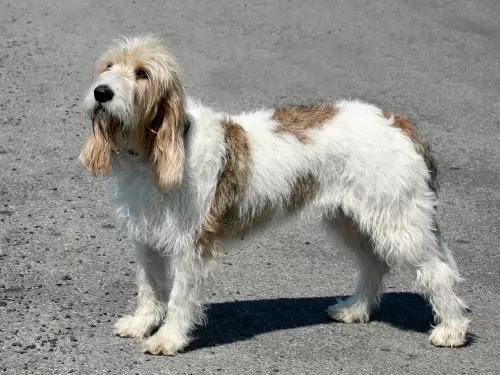 The Grand Basset Griffon Vendeen is a French scenthound that has changed over many centuries and today the area in France where they originate from, has contributed to the dog's looks.
The Grand Basset Griffon Vendeen is a French scenthound that has changed over many centuries and today the area in France where they originate from, has contributed to the dog's looks.
The rocky and thorny region of Vendeé required a hardy breed of dog. Also, hunters wanted a slower hound that they could keep up with, and the idea was to shorten the legs of the dog.
By the end of the 19th century, the Basset Griffon Vendéen was developed. By the 1950s, the Grand was considered a separate breed. and Petit was not banned until 1977.Today the dog is a long-backed and short-legged hunting dog.
 The Danish Broholmer is a large dog that looks familiar to the Mastiff. The dog stands roughly between 66 and 75cm and weighs between 40 and 60kg.
The Danish Broholmer is a large dog that looks familiar to the Mastiff. The dog stands roughly between 66 and 75cm and weighs between 40 and 60kg.
The body is strong and muscular and he has the large head of the molosser. The coat of the dog is short and harsh, with the color being fawn, light brown, yellowish or black. He is quite a heavy shedder and will require brushing twice a week.
The dog usually has a black mask.The muzzle is also large, the nose black. His ears are medium-sized, set high and floppy, the chest deep. The tail is long and carried downwards.
The Danish Broholmer is an awesome family pet who seems to go out of his way to please his human family. He is an intelligent dog and obedient by nature. Because he is so devoted to his human family, he wants to protect them too.
He is a non-aggressive dog and the best part about owning such a dog is that he is a gentle pet for the family but he still looks threatening to intruders.
The Danish Broholmer gets on well with children and pets in the home. However such a big dog needs to be trained and socialized and he could jump up against smaller people and unintentionally send them flying. Training will see to it that he responds well do simple commands such as ‘down’, ‘sit’, lie-down’ and ‘come’.
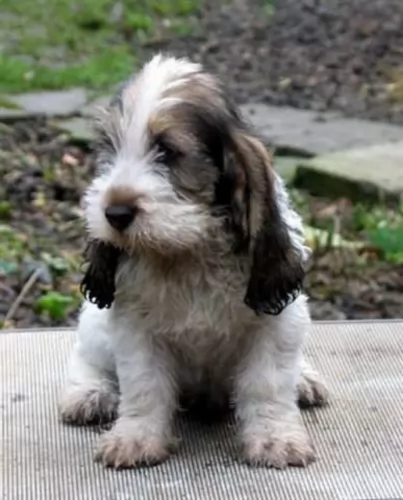 Kept today essentially as a domestic pet, the Grand Basset Griffon Vendéen is a strongly built dog, a rough-coated scent hound of medium size standing at roughly 39 to 45cm in height and weighing 18 to 20kg.
Kept today essentially as a domestic pet, the Grand Basset Griffon Vendéen is a strongly built dog, a rough-coated scent hound of medium size standing at roughly 39 to 45cm in height and weighing 18 to 20kg.
The coat is medium length, shaggy and wiry. It is essentially white with orange markings. Sometimes he can be tri-colored, having a combination orange, black or tan markings. The Grand Basset Griffon Vendeen’s coat is double with a thick, weather-resistant undercoat and a rough, harsh topcoat. In addition to regular brushing, this breed’s coat needs to be hand-stripped once a year.
His legs are straight, and he is longer than he is tall. He is a deep chested dog with long ears and a long tail. He is also noted for his mustache and beard with long eyebrows.
Your Grand Basset is a courageous, happy, confident dog, active and having great stamina.
He is a social, pack dog so he will be wanting plenty of time spent with his owner, failing which the owner should invest in another dog too. He will get on great with children and he is also a pet-friendly breed who will get on well with cats too. He is sharp and alert and responds well to training and socialization.
 Once people have owned a Danish Broholmer, they have got nothing but good comments about them. You hear words such as courageous, sweet, good-natured, playful and intelligent. Also if he believes his family is in danger he will want to protect them.
Once people have owned a Danish Broholmer, they have got nothing but good comments about them. You hear words such as courageous, sweet, good-natured, playful and intelligent. Also if he believes his family is in danger he will want to protect them.
He is a great friend for child and adult and a fairly low maintenance breed too. He is an adaptable dog, but his size isn’t suited to small, cramped spaces. He will need to be exercised but this should be a pleasure as every human being can use some additional exercise themselves if they want to remain healthy.
Look after your wonderful amicable Danish Broholmer and he’ll shower you with his doggy love and devotion.
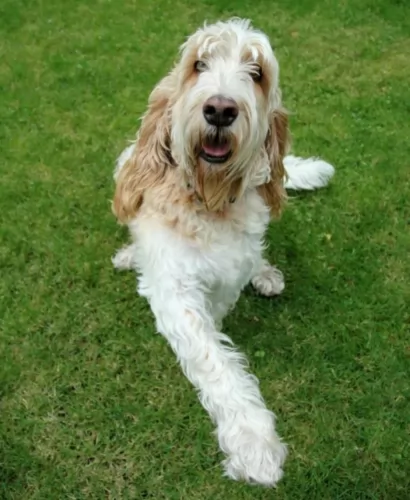 This long-backed, short legged hunting dog has a happy, confident personality.
This long-backed, short legged hunting dog has a happy, confident personality.
While he was used originally for hunting, he is now commonly kept as a companion dog. He is energetic and independent and will require you having him join you for walks and a ball game too.
Non-aggressive and adaptable he can live in the city or in the countryside so long as he receives plenty of attention and love – then he'll be a splendid pet.
 The Danish Broholmer is a large dog who can consume quite a lot of food. With large dogs like these, there is often strain on the dog’s joints.
The Danish Broholmer is a large dog who can consume quite a lot of food. With large dogs like these, there is often strain on the dog’s joints.
Also dogs with deep chests are also prone to gastric dilatation volvulus or bloat. In fact, large dogs can also suffer with obesity apart from joint problems. It is why they often live shorter lives than smaller dog breeds. Some points to consider with your large breed pet -
Nutrition is most important for puppies and your adult dog. Don’t overfeed your large breed puppy as he can grow too quickly so that his joints are at risk of injury.
Too much weight gain as well as too much exercise can increase the risk of your dog developing hip dysplasia. This is a hereditary disorder, causing problems with the hips. The disease can lead to terrible pain and sometime lameness. Always remember to keep the weight of your dog in a healthy range to prevent pressure on the joints.
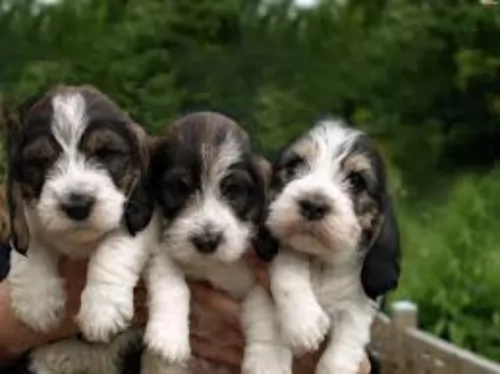 There are some Basset Griffon Vendéens that have reached 17 years of age. This is excellent for these dogs and lifestyle, nutrition and exercise can all play a part in the longevity of any dog.
There are some Basset Griffon Vendéens that have reached 17 years of age. This is excellent for these dogs and lifestyle, nutrition and exercise can all play a part in the longevity of any dog.
Generally they live to be 10 to 14 years of age. While he is a pretty robust dog, you'll want to be aware of some of the diseases which may require veterinary intervention -
Cancer is a major cause of death in elderly dogs, but if caught early, the dog can be cured. These cancers can be malignant lymphoma, skin cancer, bone cancer or soft tissue sarcomas. You'll notice a lump on your pet or a wound they won't heal. When you notice your dog not feeling well, get him to the vet.
A common form of heart disease in dogs is valvular disease, heartworm disease and myocardial disease. The signs of heart disease in your pet will depend on the severity of the disease and type. As heart disease moves on to congestive heart failure, you'll notice symptoms such as difficulty with breathing, fatigue, loss of appetite and weight loss. You need to get your dog immediately to the vet.
Dog allergies can be caused by pollen, medications, food or insects. You'll notice your pet scratching, he'll have watery eyes and inflamed skin. This inflammatory condition can cause a lot of agony for your pet, driving him mad with pain and the desire to scratch and lick. Relieve his discomfort by getting him to the vet as soon as possible.
 For his size, you’d be inclined to think that the Danish Broholmer will require a lot of exercise, but in fact he is much like any other other. He will love to join you on your daily walks and will readily run to fetch a ball.
For his size, you’d be inclined to think that the Danish Broholmer will require a lot of exercise, but in fact he is much like any other other. He will love to join you on your daily walks and will readily run to fetch a ball.
Your Danish Broholmer will require quality food manufactured exclusively for large dog breeds.
There are excellent manufactured dog foods out there and you can take the kibble and mix in some home-made foods from time to time such as cooked brown rice, vegetables and chicken. He will also require some raw meat added into the diet occasionally.
Never leave him without a constant supply of cool, fresh water.
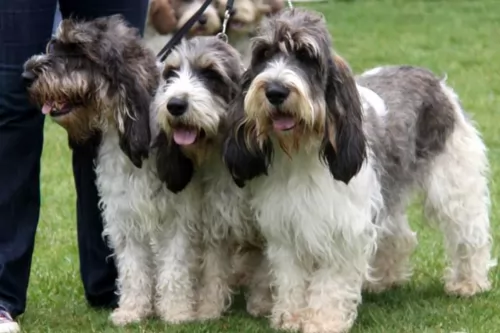 If you are going to be feeding your Grand Basset Griffon Vendéen kibble, there are excellent brands that bring out breed-specific formulas for age, size and energy levels of dogs.
If you are going to be feeding your Grand Basset Griffon Vendéen kibble, there are excellent brands that bring out breed-specific formulas for age, size and energy levels of dogs.
Feeding a dog is an individual choice, but good food can increase his longevity. A bit of raw meat mixed into his kibble, or some cooked brown rice, vegetables and chicken will be excellent for him. This can be a tasty variety to his diet.
Fresh, cool water must always be available at all times.
The Grand Basset Griffon Vendeen’s coat is double and the rough, harsh coat will need brushing twice a week and stripped once a year.